Tuesday, January 30, 2007
Photographic Evidence that Gymkata is on DVD!
Granted, it's not nearly as cool as owning Kenneth Anger's camera but I too have gained possession of something I have craved for a very long time. At long last, the second greatest movie of all time, Gymkata is available on DVD. And here's the proof of it on the racks at the Union Square Virgin Megastore this afternoon (astonishingly, it looked like I was the first one to snag a copy).

I've just been showing my copy of Gymkata around the neighborhood, and proclaiming it the second greatest film of all time whilst holding it aloft into the heavens.

The skill of gymnastics, the kill of karate! Get in on DVD right friggin' now! (And for more on Gymkata, here's a new appreciation I wrote this week for IFC News in honor of its DVD release)

Labels: Gymkata
Anger Management
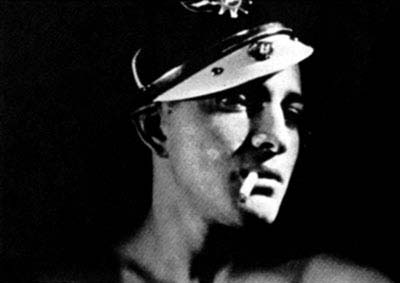
Our pal Mike Lyon over at Fourteen Seconds has a remarkable story to tell. Through his job at the swank Walker Art Center in Minneapolis, he hung out with Kenneth Anger for an afternoon - and managed to buy a 16mm camera off of him! And not just any camera, but the one Anger used to film the legendary Fireworks (1947)! Oh, those sailors!
There is photographic evidence of this, so go check it out!
Babel (2006)

I'm gonna put myself out on a limb right now and say Babel is going to win the Academy Award for Best Picture. Not because I like it, or because I think it's any good. But because it's exactly like Crash, and that won Best Picture and hell what worked before shall work again. I'd rank it fifth amongst the Oscar nominees (behind The Departed, The Queen, Letters From Iwo Jima, and Little Miss Sunshine in that order) and about one hundred and twentieth out of the one hundred and fifty or so movies released in 2006 I saw last year. But hey I don't get a vote.
Babel is a movie for people who want to feel bad at movies. Escapism is a common term when describing movies. People go to the movies to escape. Conversely, one goes to Babel to feel bad; to feel guilty about being happy or feeling love or trying to conduct your life as if it means something more than horror and sorrow. Babel is the opposite of escapism: it is miserism.
Note I said director Alejandro González Iñárritu wants us to feel bad; I don't think Iñárritu necessarily wants us to think about feeling bad or the horrific tragedies that befall just about every single character in the movie because if we did we'd probably realize how utterly full of shit the story is. There are four main stories: in the first two boys in Morocco horse around with their father's new rifle and shoot a bus; in the second, a Mexican nanny takes her charges from San Diego to her home south of the border for her son's wedding then loses them crossing back over the border; in the third, Cate Blanchett gets shot by the Moroccan kids, spends two hours bleeding in a Moroccan village while Brad Pitt yells at the rest of the tour group he's with; in the fourth, a deaf and mute teenager tries very hard to have sex with every male on the island of Japan. The first and third stories very obviously connect. The second story is connected because the two children in it are Brad Pitt and Cate Blanchett's (meaning that in one week Pitt's wife gets shot and his children get lost in the Mexican desert, meaning he has the worst week in history of the world, meaning somewhere Jennifer Aniston is smiling). The fourth story does not connect at all, except that the horny Japanese girl's father is a game hunter and he gave his rifle to his Moroccan tour guide as a token of appreciation, and that rifle is the one that shoots Cate Blanchett. In other words, the fourth story does not connect.
There isn't a single joke in the movie (then again, there isn't a single joke in Iñárritu's entire filmmography) and things are so unrelentingly grim that eventually it becomes hopeless to care about the characters because a)we know absolutely nothing about them beyond the fact that they are here to suffer for us and b)they're only going to suffer anyway regardless of how we feel. It becomes a good deal more interesting to actively root against the characters — man was I ever hoping those whiny kids lost in desert would stay lost.
Still, there is much to learn from the pervasive negativism prescribed by Iñárritu and co-writer Guillermo Arriaga (the pair have made better films than this, though they're all about this cheery). Here's a sampling of what Babel teaches us:
Don't guy a gun. Don't shoot a gun. Don't leave your children with a babysitter. Don't be a tourist. Don't go to your son's wedding. Don't go to Morocco. Don't live in Japan. Don't be deaf. Don't lie to the police. Don't not wear underwear. Don't stick your dentist's fingers in your bathing suit area. Don't have children. Don't drink alcohol. Don't go hunting and then give your rifle to your tour guide. Don't cross national borders without letters of permission. Don't be related or connected to Brad Pitt in any way. Don't get lost in the desert without a bright red sash you can fling about for maximum symbolic value. Don't present yourself naked to helpful police officers. And, seriously people, don't buy a gun and shoot it and shit. Just don't.
In other words, don't do anything. If you are the slightest bit agoraphobic: do not see this movie.
Look, I'm all for a filmmaker presenting the world in a harsh light, or portraying the dark, and horrible, and frustrating things about the world. I practically prefer it. I don't need escapism all the time. But I need something to break up the monotony.
Labels: Academy Awards, Brad Pitt, Sticking Your Dentist's Fingers in Your Hoo-Hah
Monday, January 29, 2007
Of Love and Eggs (2004)
 I'm filled with longing for Opera Jawa, Garin Nugroho's epic musical retelling of a story from the Ramayana, an ancient sacred text in India. The film was commissioned by the New Crowned Hope festival in Austria which celebrated the 250th birthday of Mozart. Tsai Ming-liang's I Don't Want to Sleep Alone and Apichatpong Weerastehakul's Syndromes and a Century (both to be distributed by Strand in the U.S.) were also commissioned by the series, which was curated by Peter Sellars. Praised by the likes of Johnny Rosenbaum, and not likely to snag a distributor anytime soon, I can idealize it in my head as a masterpiece of visual storytelling without having the nagging annoyance of seeing the film itself. It's fun to yearn.
I'm filled with longing for Opera Jawa, Garin Nugroho's epic musical retelling of a story from the Ramayana, an ancient sacred text in India. The film was commissioned by the New Crowned Hope festival in Austria which celebrated the 250th birthday of Mozart. Tsai Ming-liang's I Don't Want to Sleep Alone and Apichatpong Weerastehakul's Syndromes and a Century (both to be distributed by Strand in the U.S.) were also commissioned by the series, which was curated by Peter Sellars. Praised by the likes of Johnny Rosenbaum, and not likely to snag a distributor anytime soon, I can idealize it in my head as a masterpiece of visual storytelling without having the nagging annoyance of seeing the film itself. It's fun to yearn.But when I saw that one of Nugroho's recent works was showing as part of MoMA's Global Lens
series - I pounced. The film is Of Love and Eggs (2004), and it's downright delightful. As intimate as I expect Jawa to be expansive, it focuses on one block of a market square in Jakarta, Indonesia. The block is recreated entirely in the studio, lending the film an artificiality that Nugroho uses to display his idea of community as theatre. To further reinforce this, he takes one of the characters from the film, a deaf girl, places her in front of a colorful mural at the local mosque, and has her sing songs, comment on the themes of the film, and close it out by saying (paraphrased) "Of course there's a happy ending, it's a story."
Inside of this playful self-reflexive frame are the people of the market, and their daily dramas and comedies: they play badminton, pine for the rich girl who lives above the market, bumblingly coax a woman out of suicide, watch footage of an earthquake on TV, and reminisce about the old days. Nugroho knows and loves these people, and his generosity towards them enriches every frame.
There's a pattern of missing mothers, three of the central characters, all children, have lost their mothers and try to replace them with others, or pine patiently for their return. There is also a masterful use of objects - eggs in particular. They serve as capital, weapons, a means of flirtation, and food. In one of the final scenes, a sullen man who had raised his irrepressible brother all on his own, and who had said no more than a few lines the entire film, grunts in assent to cook egg noodles for the rich girl who lives in the new apartment buildings above them. Her radiant smile proves that this was a declaration of love. It's a scene to rival one in the greatest film of them all, when another reticent male proves his love implicitly through an action: John Wayne's refusal to let Angie Dickinson perform her cabaret act in Rio Bravo. There is no greater compliment.
Labels: Garin Nugroho, New Crowned Hope, Of Love and Eggs, Opera Jawa
Thursday, January 25, 2007
American Idol Week Two: Memphis and New York City Go Auditioning!

American Idol ebbs and flows with excitement, and though last week's tour through Minneapolis and Seattle left us listless, Memphis and New York City kicked some serious ass in the audition room.
I noticed something that the producers are making us more privy to this season, which is that Simon Cowell is always on his cell phone. And sometimes more than one. As he arrived to the second day of auditions in NYC he had count 'em three cell phones on hand: one stuck to his right ear, and another two collapsed into a small silver pile on his left shoulder. He must be popular. What an efficient multi-tasker he must be, too, to be able to juggle so many conversations at once.
Speaking of Simon, he finally uttered one of my favorite one-word criticisms: "horrible." It's a classic.
I'm waiting now to hear other recurring favorites like "pure." That one might not come out for a few more weeks, though he is back to labeling things "cabaret," which I like very much, and is usually a spot-on assessment when he chooses to use it.
There was a new snarky Simonism last night that filled me with delight: "That comes under the category of annoying." Surely it's the best quote of the night.
I am also beginning to find Simon rather sexy, but I digress. I still don't like how he condescends to Paula on occasion, but I have to say that on Paula's behalf, she was in tip-top shape this week, and didn't look even a little bit drunk. In this week's Us Weekly she is also quoted in the "Loose Talk" section confirming again that her interview with a Seattle TV station, in which she appears slurring and disoriented, was due to technical difficulties. She says she had a Birmingham TV station talking to her in one ear, and Seattle in the other.

In Memphis she was her usual smiles and enthusiasm, and the same goes for her appearance in New York. So far this season, she sounds sharp and articulate--at least compared to previous seasons where she sugar-coats contestants with lines like, "I think you are a star." I don't believe this is what any contestant wants to hear from a judge, because ultimately it is not constructive, and rather misleading. Not all of them are stars. The top 5 at best will go on to make celebrity names for themselves.
Kelly Clarkson is the only one from season one to make it big, while the flavorless Justin Guarini (look how annoying he is!) hangs dully in her shadow . Last year's Idol was probably the season that yielded the most marketable singers. Idol winner Taylor Hicks and runner-up Katherine McPhee (whose self titled CD debuts on January 30th) are the biggest names across the airwaves, but we've heard, too, a lot from Chris Daughtry and even the good-looking, if somewhat boring Ace Young. Seasons past gave us some surprise stars like Jennifer Hudson (who's now nominated for an Oscar for her supporting role in Dream Girls), but generally, the contestants who don't win have a sticky start to stardom.
The judges are under fire recently for being too harsh on the hordes that show up for auditions. But I have to wonder how these critics expect Randy, Paula, and Simon to react to the delusional and tone deaf who so often plague the auditioning room. I mentioned last week that Simon, clearly Idol's most blunt judge, can be rather responsive and encouraging if the contestant is a) good, and b) self-aware. The bad contestants have to show up because they are entertaining, and because they are the life-blood of the show during auditioning. The judges could take them with a grain of salt, but if they are too lax with the mediocre, or just plain bad, they end up sounding condescending with praise that leads the contestants to failure. The judges say it over and over, "We're looking for the best." "Good" just doesn't cut it.
Last night in at the New York auditions, Ashanti, a singer who was back to audition for her third time, pleaded with them to let her go on to Hollywood with such disgrace and melodrama that it became embarrassing to watch. These are the kinds of contestants that need to learn how to bow out with decency, so as to avoid the backlash from Simon, which in Ashanti's case ended with a terse, "Get over it."
I always look at auditioning season as a lesson in manners, and it's astounding to see how many contestants just don't have any. Instead they come out of the auditioning room cursing and name calling, and when the words get too dirty they are happily bleeped out with that bubbly blue American Idol logo over their lips, while being escorted from the building by security.

Speaking of swearing, Simon, Paula, and Ryan all said swears last night! Ryan called Simon an @!*-hole, and I think that's what Paula called him, too. Maybe things are feistier this season?
And here's a short run-down of the people I liked this week: "Sundance," Melinda Doolittle, Kia Tompson, Jenry, Jory, and the girl who said she was "militant" in her training (though she was kind of annoying).
Next week: Birmingham and Los Angeles auditions
Wednesday, January 24, 2007
Two Wrenching Departures (1989/2006) & Stomp the Yard (2006)

Within one week in 1989, two close friends of filmmaker Ken Jacobs passed away. They were Jack Smith and Bob Fleischner, two compatriots, who along with Jacobs, helped to cultivate the NYC Underground film scene (Flaming Creatures (1963) being the landmark). That year, Jacobs performed a "Nervous System" piece entitled "Two Wrenching Departures" at the American Museum of the Moving Image. His "Nervous System" pieces involve running two projectors simultaneously, playing with filters and projection speed in an improvisatory way. This piece was an homage to his two friends, utilizing film they shot in the mid to late 50s, when they were cinema-mad, as an intertitle states in the version I saw.
This past week a newly edited, single projector version of

Stomp the Yard, the deserved box office champ the past couple weeks, moves in a different way, as it adheres to the codes of the teen dance genre. As there is artistry in Jacobs' play with the image, so there is artistry in Columbus Short's effortless physicality on the dance (or step team) floor. Director Sylvain White slightly speeds up select instances of motion, emphasizing the other-wordly feel of some of these moves - the most astonishing of which occur in the break-dancing sequence that opens the film, an ebullient explosion of energy as two teams battle for local supremacy (the greatest contribution of these teen dance films to the musical genre are these "battles", an idea implicit in so many Golden Age sequences where duos show off for each other, but here brought up to the surface). It inhabits its requisite cliches with warmth and humor, and the performances are strong all around, especially the quiet nobility of Short and the under-utilized narcissistic wit of Ne-Yo.
Notes on a Sundance Film Festival
 -Days at Sundance: 5
-Days at Sundance: 5-Number of Movies I Covered: About 20
-Number of Movies I Saw: 1 (2 if watching Snakes on a Plane on DVD tonight counts)
-Best (And Only) Movie I Saw at the Festival: Snow Angels
-Funniest asshole encounter: the gentleman at one of the corporate lounges who launched into one of the most condescending tirades I've ever heard in my life. Our crew had innocently plugged our lights into a wall socket, not realizing that there were special sockets reserved for us. After a couple interviews, said gentleman came over and, without an introduction or hello, let loose with, "Who's the dimwit who doesn't know how to plug in a light?" At a basic level this isn't even a correct insult; we knew how to plug in, just not where. "We have dedicated lights for you guys! But you need to ask!" he roared. Difficult to ask when you don't know you're supposed to.
-Number of Parties I Attended: 0
-Number of Alcoholic Beverages Consumed: 4
-Most Charming Male Interview Subject: Billy Crudup
-Most Charming Female Interview Subject: Sarah Polley
-Number of Compliments Received on My Interview Technique: 2 (Sam Rockwell, Bob Balaban)
-In Joke of the Festival: Encouraging members of the IFC News team with the phrase "Dude -- cut a hole in the box!"
-Most Surreal Moment: Briefly speaking to Dennis Hopper about The Last Movie before our interview. When I told him I'd just seen the film a few months ago at Anthology and that I absolutely loved it his response was more perfect than I could have ever imagined: "Really?" he said. "Far out."
Tuesday, January 23, 2007
Thoughts on the Oscar Nominations

-Not surprised Dreamgirls got the most nominations; hugely surprised it didn't get the Best Picture nod — and equally surprised that Little Miss Sunshine had enough support to get one. In this week's IFC News podcast, Alison Willmore and I picked our winners: I only got 3 out of 5.
-I did get all 5 Best Actress nominees right. Booyah.
-Love the Best Song nominees. Dreamgirls, Dreamgirls, Dreamgirls, Cars, and... An Inconvenient Truth! Awesome — how great would it be if Al Gore got to come up on stage and accept it and break into song.
-The sole Borat nomination: Screenplay! Screenplay? Screenplay! So how exactly do you write improv anyway? I'd love for it to win and for Cohen to give another of those vintage acceptance speeches along the line of "Thank you for nominating me for something we didn't really do."
-At least Children of Men got cinematography love; editing too, though I didn't think the editing was all that fantastic (the lack of editing was what made the film unique).
Monday, January 22, 2007
A gift from Sundance
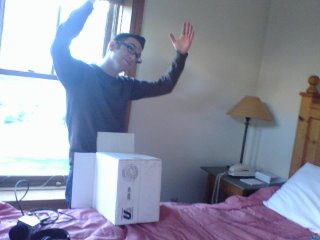
I'm not gonna get you a diamond ring, because that sort of gift don't mean anything. I'm not gonna get you a fancy car, Termite Art readers you know you're my shining star. I'm not gonna get you a house in the hills; readers like you needs somethin' real. I wanna get you somethin' from the heart. Somethin' special: it's a picture of my $&@# in a box.
Sunday, January 21, 2007
From Sundance 2007: David Gordon Green's Snow Angels
I saw the first best movie of 2006 at last year's Sundance (scoff all you want but it was Art School Confidential, and I own it now and have seen it two more times, so I'm pretty confident about this), and now I've seen the first best movie of 2007: David Gordon Green's devastating relationship drama Snow Angels. It's suspenseful, sad, and oddly hilarious.
It opens on a high school football field. The marching band is practicing Peter Gabriel's "Sledgehammer" and it is not going well. The conductor berates them ("Who will be my Sledgehammer?!?") and suddenly two gunshots ring out from the woods in the distance. We then flashback weeks earlier and meet three different couples at three different stages of relationships: flirty teens Arthur and Lila, recently separated Don and Louise (the parents of Arthur), and the long-separated Glenn and Annie. Each of the stories is progressively darker and sadder, but cutting between them blends the sweet and the sour, the funny and the depressing. The frequent and sudden swings of emotion throw audiences for a loop in a way that reminded me of Children of Men.
I'm not one for prognostication because, honestly, I'm not smart enough about the business. But if Sam Rockwell doesn't get an Oscar nomination for this performance once the film receives a release there is something wrong with the system. As the alcoholic, born again Glenn, he gives the performance of his career to date: always sweet and funny enough to show why the people around him suffer his ample and numerous flaws. He's a good father and a terrible husband. Even at his scariest he is never less than completely sympathetic and more than a touch pathetic.
I wasn't particularly enthused in the first act (it felt a little too Little Children to me) and Kate Beckinsale is a little too beautiful for the role of Annie. But the pacing is perfect, the storylines totally engrossing, and Green's subtle visual work (from the delicate focus shifts to brilliant metaphors) is inspired. A lot of Sundance movies look like works-in-progress; many are. Snow Angels is a complete experience. I hope Green doesn't change a shot.
Saturday, January 20, 2007
We're video podcasting daily from Park City and Sundance 2007
Hey gang, I'm out in beautiful Utah at the Sundance Film Festival, and this year, in addition to our usual TV coverage, we're doing daily video podcasts. They're going to be about all sortsa stuff, the first one is just a quick fun intro about getting a press pass. You can just go to IFC.com/sundance for constant updates. Here's a direct link too:
http://ifc.com/news/article?aId=18729
So be sure to keep checking that; we'll be here through Wednesday.
Friday, January 19, 2007
Deja Vu

Deja Vu opened in late November and completely slipped my notice - I had written Tony Scott off after a particuarly repulsed late night viewing of "Man On Fire" a few years ago. I considered him to be a flashy sadist whose fast-cutting disrupted any sense of tension his action set-pieces set out to build. But then I read, with much curiosity, Mark Peranson and Cristoph Huber's impassioned polemic at CinemaScope, "World Out of Order: Tony Scott's Vertigo", which tries to revive Scott's critical reputation and position him as an auteur. The piece is a great piece of provocation, as they claim the "Great" Scott's (to differ him from his pretentious brother Ridley, as the two say) films to be reflections on filmmaking and the proliferation of images in the modern world - with Nicole Kidman's line in Days of Thunder, "Control is an illusion", to be a statement of purpose. They consider "Deja Vu" to be his masterpiece. To further pique my curiosity, they're rather dismissive of Man On Fire, which they admit is difficult to watch. So much to my delight, Deja Vu is an efficient and at times provocative thriller, with shades of Hitchcockian obsession and guilt. It also contains one of the most ingenious action sequences I've seen in American cinema over the past couple years.
Part of my enjoyment stems from the relative restraint Scott shows in his stylistic choices. The film is still filled with crane shots and slow-motion, but he eliminates his recent penchant for using a variety of film stocks, and the cutting time seems to have slowed down a bit from the manic pace of Man On Fire.
Denzel Washington, quickly becoming a TS axiom, plays a gregarious but hyper-professional ATF agent who's investigating a terrorist bombing of a cruise ship that was carrying Navy kids to party on Fat Tuesday (the film takes place in post-Katrina New Orleans, a fact which is not belabored or exploited). He's soon spotted by FBI agent Val Kilmer (appealingly unkempt and paunchy) and tapped to assist a special investigative unit on the case. It's quite special - as they're using a machine that can see into the past - four days into the past, to be exact. The investigation points to a woman (Paula Patton) who is connected to the main suspect. So they use the machine to watch her movements from four days previous, and Denzel soons becomes obsessed with her, idealizing her through this ultimate voyeuristic device.
Washington's actions blur the line between heroic and maniacal, as he directs the investigative unit's machine to focus exclusively on Paula, setting up compositions for her day-to-day life. Filmmaking as voyeurism, and added with a special tang of 24 hour surveillance. So enamored with his celluloid muse, he tries to rend her out of the past and remake her in the flesh. An alternately moving and disturbing paen to the director-actress relationship.
I hear Enemy of the State and Domino are rather fun as well. I can't wait.
Thursday, January 18, 2007
The IFC News Podcast -- Now on iTunes and Ready For Subscriptions!
We've been posting weekly podcasts on IFC News for a few months now, but they were basically just sound files housed on our website. Now we've got ourselves a feed, we're up on iTunes, and the whole thing seems a lot more official like. Here's a link to the direct feed and here's a link to the iTunes page for the podcast where you can subscribe and get it delivered, fresh and toasty, to your computer each week.
And now back to your regularly scheduled Am Idol analysis.
Wednesday, January 17, 2007
American Idol Season Premiere: Minneapolis and Seattle go Auditioning!

Thank God American Idol is back. Really, thank goodness it is back!
There was a lot of anticipation that led up to yesterday, the first day of auditions, and the first show of the season. I got
 jittery. Unless you were one of the many unlucky souls (or soul-less) that actually auditioned over the summer of '06, this was the first time we've seen Ryan Seacrest, Simon, Randy, and Paula since last May. Boy we were overdue.
jittery. Unless you were one of the many unlucky souls (or soul-less) that actually auditioned over the summer of '06, this was the first time we've seen Ryan Seacrest, Simon, Randy, and Paula since last May. Boy we were overdue.Let me explain how thrilling it was to hear Randy's voice again--it was thrilling! Simon has always been my favorite judge, not just because he "tells it like it is," but because he is often the most balanced and articulate, and I dare say the most respectful judge if the contestant is responsive, at least halfway talented, and otherwise self-aware. Though it had been so long, and when I heard the first rumblings of Randy's tenor a feeling of peace came over me. It was like a familiar voice you take for granted, like a dad's or a brother's. I missed him!
Paula was another story. The past week we've seen her now infamous bit on a local newscast, apparently inebriated, but perhaps much worse. There is too much speculation as to what's wrong with Idol's most bouncy and accessorized judge, so we should simply say for now that she was "tipsy." This chapter in Paula's life remains "to be continued" until the E! True Hollywood Story debuts...
Paula hardly spoke during the Minnesota shoot. She must have been soused those days, too, and so much so that the producers called in pop singer Jewel to provide a (coherent) female perspective. I wish she wasn't there, though. I wish it were the original three---why where you wasted, Paula?! It ruins the dynamic, which is too important to compromise at the outset of season 6.
And so, audition season is off..
...to a lame start.
Minneapolis: a disaster.
I cannot be forgiving of this city's auditions; they were dull, absolutely. Though, out of the gray came a few names that I predict will strut their stuff in the coming months:
1) Denise, aka "The Crack Baby"
What a way to intro yourself, right? I mean, she literally said, "I was born a crack baby." (gag) And of course, she has an amazing voice—she really does. People are going to like this one because she's a good sob story, of the likes of Kelli Pickler (from last year, Season 5). But like Pickler, American won't end up picking Denise. She's simply "good," kind of how Paris Bennett turned out to be (also Season 5).
2) Jarrod Fowler, aka "The Airforce Guy"
He's got a good attitude so I like him off the bat. He's in an armed service, so America likes him off the bat. Plus he can really sing (the point of the competition, after all), and is definitely more interesting and dimensional than Denise.
3) Rachel, aka "The Chick in the Army Reserve"
She talks to the picture of her husband who's in Iraq. It's cute. She's got a good attitude, too (boot camp does wonders, I guess), and a fantastic sense of humor. Good voice, and in fact one of my favorites of the night.
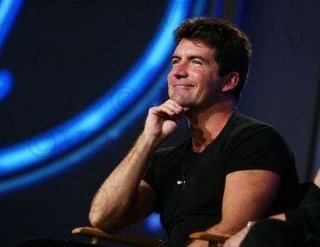
But the best part of the Minneapolis auditions was the return of Simonisms. According to Simon, one who auditioned named Michelle was "confident without being irritatingly precocious." Who talks like that? Simon does! Fantastic!
Night Two: Seattle
If Minneapolis was a disaster Seattle was the DMZ, or a nuclear test-site of auditioning nightmares. It never ceases to amaze me the amount of crippling delusion so many contestants suffer. "Tone deaf," "horrible," "a mess," are just a few of the ways these people were described.
One person claimed a dry scratchy throat for her poor performance. Fool! Have you seen the auditions on television before? You should know better, contestants, than to declare such superficial ailments.
She asked for a drink of water.
Simon: "You could lie in a bath with your mouth open."
This one did not make the cut, needless to say.
A few prevailed:
1) Thomas, aka "The Guy Who Slept behind Trash Cans the Night Before Auditions"
He was smooth, soulful. I'm looking forward to this guy, despite his ego creeping up on him.
2) "The Twins" (I don't know how to spell their first names)
Very cute twin brother and sister of Indian ethnicity, who I will enjoy watching compete against one another. Sibling rivalry! Hurrah!
3) Jordin Sparks, aka "The 16 Year Old with Big Hair"
She's great! She's a mix of Diana DiGarmo and Jennifer Hudson (neither of whom I originally liked). Simon thinks her smile is
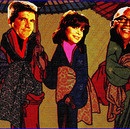 too cutsie. Randy and Paula made fun of him. Judges' rivalry! Hurrah!
too cutsie. Randy and Paula made fun of him. Judges' rivalry! Hurrah!Signing off for now. Until next Tuesday when we’re treated to American Idol Memphis Auditions Edition! I expect great things.
Idiocracy (2006) and VH1's The (White) Rapper Show and How One's Existence Validates the Other
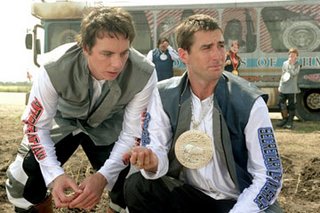
The two scariest movies of 2006: In Children of Men people can't have babies. In Idiocracy, people won't friggin stop.
In Mike Judge's vicious satire Idiocracy, the greatest threat to the future of human society is not terrorists, or weapons, or disease, or aliens, or global warming, it's something far more insidious, and far more terrifying: it's stupid people breeding. When you hear Judge's cute premise — average joe wakes in a future where everyone is so stupid he is now the smartest man on the planet — you chuckle and then you think "Yeah, but it could never happen." Judge's ingenious prologue shows how this anti-Children of Men came to be, and it's utterly convincing and totally hilarious. In many ways its a high point of the entire movie.
It's always fun when you see two totally disparate things that so perfectly reflect on each other. The day I finally saw Idiocracy (on DVD, after New York was deemed unworthy of the film's teeny tiny theatrical release back in '06), I was flipped channels and came to the first episode of something called The (White) Rapper Show. This reality series, aired on VH1 (which, with shows like Celebrity Paranormal Project and, my personal favorite, Breaking Bonaduce, is due for a new slogan. I suggest: VH1: Where Scruples Don't Mean Jack Shit) follows a group of young unsigned rappers all battling (better yet, make that battle rapping) for half a million dollars. As far as I can tell there is no recording contract involved, or opportunity to actually make inroads into the recording industry as a white rapper, but for 500,000 bones you can probably buy some of those anyway.
Any reality show that gets a genuine cross-segment of the population will have at least one moderately stupid person in its cast. The (White) Rapper Show has like eight of them, and they're all stuck together in a grimy house in the Bronx where they all yell and scream (and, occassionally, rap) in ways that time and again prove that Judge's theory of human de-evolution is not only possible, it is far closer than we might first realize.
It's hard to pick a single favorite — I could easily write a post on three or four different white rappers in the group — but let me just pay homage to John Brown a.k.a. The King of the 'Burbs. Mr. Brown, who refers to himself often as The King of the 'Burbs, proclaims that he isn't just a rapper, he's an entity, and part of a huge movement called The Ghetto Revival. The other white rappers observe the oxymoronic nature of those two terms in a conversation that went something like this:
Q: How can you be the King of the 'Burbs and be part of the Ghetto Revival?
John Brown: Because I'm John Brown, King of the 'Burbs, part of the Ghetto Revival.
Q: How will you revive the ghetto?
John Brown: With the ghetto revival.
By the end of the episode, John Brown has been disrespected, called the N-word, and had a dildo shoved in his mouth. If you think I'm making this up, I appreciate your belief in my creativity, but point you to the man's MySpace page.
In other words, Mike Judge is Nostradamus. Idiocracy isn't as good as Office Space; it might not be half as good as Office Space. Then again, it might be better, or at least truer, but in its truthiness (Sorry heroes, I went to a Colbert Report taping yesterday) it's not as much fun to watch. In Judge's horrific future, where the most popular movie is Ass: The Movie, and the highest rated TV show is Ow! My Balls!, the people are so obnoxiously and accurately stupid that they're difficult to stomach for the full ninety minutes. Luke Wilson's timelost Joe Bauers is a far more patient sort than I; after about an hour of hanging out with Dax Shepard's Frito, a lawyer and all-around bozo, I would almost certainly had started looking for something sharp to stab myself with.
By presenting idiocy with an unflinching sense of authenticity, he's sacrificed some amount of entertainment value, because the people of the future are so stupid they're often less funny than tiresome. Still, Judge's overall message, particularly in the area of corporate branding and product placement, is chillingly funny — I firmly believe that someday the Secretary of Defense of this nation will constantly mention that his position is "brought to you by Carl's Junior." Or, if we're lucky, by the Ghetto Revival.
Monday, January 15, 2007
The Golden Globlog: 2007

Miss Golden Globes reluctantly welcomes you to Termite Art's exhaustive coverage of the Hollywood Foreign Press' yearly descent into wine-buzzed megalomania.
Some important background on Miss Golden Globes: "Lorraine, age 16, is the daughter of six-time Golden Globe recipient and former Cecil B. DeMille honoree Jack Nicholson and Rebecca Broussard. Lorraine is an actress whose credits include the hit 2006 comedy “Click” starring Adam Sandler, “The Princess Diaries 2: Royal Engagement” and “Something’s Gotta Give.”" I liked Click. Thanks Miss Golden Globes.
-We begin with a bang - with a faux Cher disco track with a variety of "stars" making ambiguous hand gestures. I'm hooked!
-Clooney has excellent action going on with his hair. Lots of swoosh. Jennifer Hudson shocks no-one with a Supporting Actress win and delivers a sincerely humble speech, although I wish she didn't thank hack director Bill Condon.
-Timberlake stands awkwardly waiting for Prince to pick up the best Song award for Happy Feet, but he doesn't show. He must be busy preparing the Super Bowl half-time show - I'm praying for some assless chaps. JT mocks Prince's height at the mic stand. Clever. Some say JT just rips off Prince - I say it's a knowing and brilliant homage.
-there she is! Our girl! Miss Golden Globes! She's all sparkly! What a delight!
-Jeremey Irons gets nominated for a non-dragon related movie for the Elizabeth I TV movie. He wins! Interesting facial hair for Jeremey. It looks like he's working on a beard but it's coming in rather patchy. Brangelina smile vacantly as Irons acts the cad. He's didn't mention Inland Empire. Bummer...
 -Patricia Arquette is showing a lot of forehead tonight. Hot. Kyra Sedgwick wins
-Patricia Arquette is showing a lot of forehead tonight. Hot. Kyra Sedgwick wins something. She acts shocked. I notice Sharon Stone sitting next to Dominick Dunne. Nice. Kyra gushes too much about a show nobody watches.
-It's safe to say I'm in love with Naomi Watts. But she introduces Babel, which lowers her a notch or two. So now we're down to lust. She says Alejandro Gonzalez Inarritu is "masterful". I get nauseous. She mispronounces his name - take that punk!.
-Renee Zellwegger is still pert. But her shoulders are like razorblades. Weird. We all applaud for the Hollywood Foreign Press. Huzzah! A balding old man with a limp walks on stage. Clint Eastwood looks confused at this guy. I should mention his hair looks like Coppola's Dracula. He's the group's president. Will Ferrell looking at the camera clapping slowly is funny. Did you see the Blades of Glory trailer? Please do.
-Jessica Biel and Diddy make it happen. Something TV related. Diddy has a nice ring. Emily Blunt wins supporting actress in TV drama. She was good in My Summer of Love and Devil Wears Prada. I have no idea what show she's winning for. Gideon's something or other. She says Miranda Richardson is "spookily talented".
-the Heroes cast looks unnaturally tan. Hugh Laurie takes it to the House with a win for best actor in a TV drama. I remain clever. Laurie mentions "colonic irrigations." Best speech so far. He says his crew smells like "freshly mown grass". He's killing it.
 -a Charlie Sheen sighting. He needs to make Hot Shots 3. Oh, he's intro'ing his brother's film, Bobby. My parents really liked it. Heartwarming.
-a Charlie Sheen sighting. He needs to make Hot Shots 3. Oh, he's intro'ing his brother's film, Bobby. My parents really liked it. Heartwarming.-Steve Carell looks bored reading lame joke but namechecks Geoges Melies so he ends up OK. It's for best animated film. Dave Kehr's crossing his fingers right now for Monster House. Sorry Dave, Cars takes home the gold orb. News break from John Lasseter: "Animation is awesome." Thanks, John. (Miss Golden Globes update: she's doing some expert clapping out there and I daresay she has perfect posture)
-Joaquin waltzes out. Annette Benning is downing wine as her Best Actress nom is announced. Jay-Z is looking good next to Beyonce. We all know Meryl should win. We know this. She wins and is promptly adorable - tells some producer to shut up. She's the best. Tells crowd to demand theater owners to show more independent fare. But civily, of course. She mentions Little Children as part of this, but her intentions are noble.
-the Pan's Labyrinth girl shakes hands with Angelina Jolie in a cut to commercial shot! I find this affecting for reasons I'd rather not investigate.
-Ben Stiller is wiry. He introduces that Borat movie I'm sure you've heard about. Sacha Baron Cohen smiles uncomfortably, but his lady friend Amy Adams makes up for it.
-Salma Hayek enunciates slooooooooowly. I think her English is rapidly declining. Her cleavage is still surging, though. It's the best mini-series or TV movie. I'm rooting for the Walter Hill movie, despite never seeing it. Elizabeth I takes it home. Blah blah blah.
-Rachel Weisz's cheekbones announce Best Supporting actor noms. Affleck needs this. But Eddie Murphy is the deserved winner.....and wait a second....there's Prince sitting behind him! What the fuck is going on! Did he intentionally snub JT! This is an outrage! Eddie Murphy wins by the way....and when I said he was the deserved winner, he should've shared it with Mark Wahlberg. But still, he was a badass in that movie. More thanks for that loser Bill Condon. Bummer. Entertainment Tonight needs to get on this Prince story ASAP.
-Best Actor in a TV movie or mini-series: we've got Andre Braugher (Homicide: Life on the Street - best show ever) and Bobby Duvall. Billy Nighy won for that Gideon movie. Oh, the movie's called Gideon's Daughter. It's a TV movie sweep in the lead actor category. Huge.
-Annette Benning is drunk. But Gillian Anderson is nominated. Give it to her! She was great in The House of Mirth! But the class of Helen Mirren wins. That's a daring dress for an older lady. Low cut and all that. I will not complain. Judge me if you must.
-Cameron Diaz intros The Departed. Is Timberlake dying inside at her childish insouciance? Only JT knows.
-Jeremey Piven hasn't shaved. Rebel!. Best screenplay noms. Where's Inside Man? I don't know. The Queen wins. Miss Golden Globes handles the award with delicate grace. Peter Morgan starts making a vague political speech - you have to believe public protest counts for something. Ok.
 -that hunk Tim Allen walks up with Vanessa Williams - Tim's voice is getting more gravelly and creepy. This is a good thing. Actor award for comedy. The woman sitting next to Jason Lee is gorgeous. Alec Baldwin wins for 30 Rock. He should get an award for his cumulative SNL appearances instead. But I guess this is close enough.
-that hunk Tim Allen walks up with Vanessa Williams - Tim's voice is getting more gravelly and creepy. This is a good thing. Actor award for comedy. The woman sitting next to Jason Lee is gorgeous. Alec Baldwin wins for 30 Rock. He should get an award for his cumulative SNL appearances instead. But I guess this is close enough.-James Woods would rather be at the Playboy Mansion. But here he is introducing the best comedy. Bad luck James. I never knew Kevin Nealon was on Weeds. I like that guy. Ugly Betty wins. America Ferrera freaks out - she's also adorable. This must be some sort of upset. I would like to hang out with these people.
-Jamie Foxx is cool. Damn. He intros Dreamgirls. Makes a crack how it's only open on 800 screens. I'm sure Dreamworks is thrilled.
-Sharon Stone can do nothing but smile. Best Foreign Language Film. I think Eastwood has an unfair advantage here. Highest quality category so far, Pan's Labyrinth, Volver, Letters from Iwo Jima, The Lives of Others. And of course Clint takes it home. If anyone's cooler than Jamie Foxx, it's Clint. He quotes Jennifer Hudson: "You don't know what this does for my confidence". He's awesome.
-In case you didn't know, Lexus is in pursuit of perfection. Thanks Lexus.
-Hugh Grant claims Prince was stuck in traffic - so that's why he missed his award. I don't buy it. It's a vast conspiracy to make Timberlake look uncomfortable. I'm disgusted.
-Painted Veil wins best score. I open another Beck's.
 -Stamos! Look at that stubble! He's back ladies, and on the prowl. The awards don't matter - it's all about the machismo of Stamos overpowering the room. Jennifer Love Hewitt can hardly breath through all that testosterone. But wait, America Ferrera wins, and no one was left unmoved. Seriously, I've never seen the show but a more likeable lady I've never seen. Annette Benning tears up, but that's just the alcohol, I think. America gets on camera too early for the interview, and sheepishly stalks off, before walking back on a second later. Awkward! Brunette interview babe is failing horribly at interview, asking uncomfortable question about people who didn't want America for the role. Fun for me.
-Stamos! Look at that stubble! He's back ladies, and on the prowl. The awards don't matter - it's all about the machismo of Stamos overpowering the room. Jennifer Love Hewitt can hardly breath through all that testosterone. But wait, America Ferrera wins, and no one was left unmoved. Seriously, I've never seen the show but a more likeable lady I've never seen. Annette Benning tears up, but that's just the alcohol, I think. America gets on camera too early for the interview, and sheepishly stalks off, before walking back on a second later. Awkward! Brunette interview babe is failing horribly at interview, asking uncomfortable question about people who didn't want America for the role. Fun for me.-a Tom Hanks sighting. A Warren Beatty tribute. I'm already bored. Time for a break.
-Well, I should see Reds. I hear it's quite good. And Hanks is a decent comedian, so as tributes go, not painful. Beatty: "I've got moisturizer older than Tom Hanks". Then he talks to the other old bastards, jealous of Eastwod and Nicholson. I laugh. Classy. "I asked Arnold to become a Democrat, he did what I said." Snap! He continues to ramble and I like it. He has a friend in Tennesee...
-Dustin Hoffman rips off an Ishtar joke - Ishtar 2 next year! I'll be there. Then things take a turn for the worse when he intros Little Miss Sunshine. I'd rather watch Ishtar.
-Best Director Noms. Clint Eastwood gets a double dip. Everyone else is a douche except for Scorsese. Scorsese takes it - bodes well for the Oscars. I wasn't a huge fan of the film but am happy to see him win anyway. He gets a standing O. Mentions Night of the Hunter and The Red Shoes, just because he can. Thankfully mentions Infernal Affairs - it wasn't featured prominently enough in the credits of the film, so that's good. More references, he wanted to make a WB gangster film like The Public Enemy and Angels With Dirty Faces.
-is Reese Witherspoon America's Sweetheart? It will remain unanswered. Best actor for comedy coming up. Borat wins! He saw a dark side of America, the anus and testicles of his co-star Ken Davitian. This is good. Ken raises his wine glass. Then a cut, Ken drinking from his bottle. If it wasn't for the rancid bubble he had to breath after Ken sat on him, he wouldn't be here today. I hope he wins the Oscar.
-Dane Cook will never be funny. He intros Thank You For Smoking.
-J-Lo gives the best Comedy or Musical film to Dreamgirls. They're speeding things up. David Geffen is a friend to all and kind to animals. Don't thank Condon you lame producer......damn! He did it. Screw you Condon.
-I've promised myself never to watch Grey's Anatomy. It just won the best drama award. Will this change my attitude? Only time will tell.
 -Awards are coming fast and furious now, Philip Seymour Hoffman looks like Tom Gunning (that's him to the right) with his moustache. He's on best actress watch. Mirren has this on lockdown. And she wins...
-Awards are coming fast and furious now, Philip Seymour Hoffman looks like Tom Gunning (that's him to the right) with his moustache. He's on best actress watch. Mirren has this on lockdown. And she wins...-Best Actor. Dicaprio is a beast with two noms.......but Forest Whitaker, the director of Hope Floats, takes the award. He sounds out of breath. He's overtaken by emotion and Sharon Stone is still smiling.
-Schwarzenegger on crutches hobbles out to announce best drama. Courageous. Babel and Bobby sound exactly the same coming out of his mouth. He gives it to Babel. I die inside. The only thing keeping me alive is that beautiful flower Miss Golden Globes - I owe Lorraine so much. Inarritu: "the power of cinema is universal". This guy is a genius. Miss Golden Globes....take me away!
Goodnight.
Saturday, January 13, 2007
For Your Razzies Consideration: Nicholas Cage in The Wicker Man
As first spotted on REVERSEBLOG:
Also, listen to me and Alison Willmore discuss The Wicker Man on our IFC News podcast about the worst (and, in this case, also the best) movies of 2006.
Into Great Silence (2005)

In 1984 German director Philip Groning asked the Carthusian Order of monks, members of one of the most ascetic monasteries (The Grand Chartreuse, tucked deep into the French Alps), if he could make a documentary about them. They responded sixteen years later, with a yes. They laid down ground rules: Groning could not use a crew or artificial lighting. Out of this comes Into Great Silence, an immersive film documenting the everyday life of these most reclusive of holy men. With no score or voice-over, the film is entirely experiential - no information is given about these men aside from their actions. Over 162 minutes their rituals alternate between the banal and the hypnotic: paying bills on an IBM, shoveling snow out of the garden, initiating two hopefuls into the order, group chanting lit by a single candle.
As pared down as the film is, even less should've have been done. During scenes of choral chanting, Groning distractingly cuts in random shots of nature, breaking up the visual rhythm of the bobbing heads and needlessly poeticizing what should be displayed unvarnished of artistic meddling. The form should fit the content, and these cutaways, understandable in another setting, seem decadent considering the subject. The main value in the film is uncovering these rituals that few have ever seen over the centuries, so masking them in facile (and out-of-focus) close-ups of flowers is a mistake.
That aside, it's still an immensely valuable experience - fulfilling that most basic role of cinema: to show what hasn't been seen before. The shot of monks sledding down the Alps is worth the price of admission.
Into Great Silence opens at Film Forum on February 28.
Friday, January 12, 2007
Winter Evening in Gagry (1985)

One of the greatest pleasures in moviegoing is being surprised - and I was shocked by the quality of Winter Evening in Gagry, a Russian musical from 1985. In its own modest way, it's a descendent of The Band Wagon (1953), MGM's ode to spontaneous folk performance. Winter Evening tells the story of Alexei Beglov, former national tap-dancing star, reduced to working as dance coach for a garish modern production which attempts to tell the history of IBM through dance. It also has a giant flashing sphinx. This mirrors Fred Astaire's role in Band Wagon, when he was a former vaudeville star tapped to star in a lavish production of Faust complete with blazing pyrotechnics that almost blow him off stage. The main action involves a middle-aged circus employee who asks Alexei to teach him how to tap.
The film evades all expectations after this point - the circus performer (the hilariously tetchy Arkady Nasyrov) soon proves inept and Beglov begs off the job, although they form an uneasy friendship. What happens afterward is a remarkably subtle meditation on aging, as Beglov slowly gets more absorbed in his past after a local news show plays an old clip of one of his routines, and then claims that he is dead.
There are two major musical numbers - both resulting spontaneously from artists during their down time, freed from the restraints of the stage or the director's ego. The first number, the first scene in the film, shows Beglov in his prime, on a TV set filming the routine that the TV news show shows decades later. During a break in filming, Beglov bangs out a beat on the drums, and the musicians join in, as Beglov then twirls and taps with impressive dexterity across the stage. Cut to a shot of the technicians applauding, standing in for me, and then silence, as they have to shoot. The other number occurs after Beglov shows up at rehearsal of the modern production with sparkling apple juice in tow, celebrating his life after presumed death. He gets up to the mic and sings a traditional song, about a worm wanting a bee to pick him up and fly, as the leotarded dancers waltz. Then it stops, and work has to begin - this is exactly the way the numbers work in the Band Wagon, taking place off-stage as an expression of pure communal feeling.
The ending is a stunner - as Beglov lies in his hospital bed, reminiscing about the greatest night of his life, dancing for a half empty theater with his daughter (who earlier asked him not to attend her wedding). This beautiful duet between father and daughter - a dance of spontaneous feeling in a professional setting, is filled with love and bitter reality, it's a memory that Beglov wants to stand in for his whole life, and you can't blame him for it.
Thursday, January 11, 2007
Man in the Mirror: The Michael Jackson Story (2004)
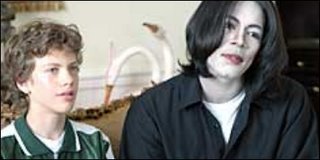
For about three years, I wrote a biweekly column called "The Good, The Bad, & The Ugly" on a now-defunct website called Movie Poop Shoot. Each piece contained three brief reviews: good and bad are fairly self-explanatory; ugly was the spot for movies so stupid, so incompetent, so embarrassing, so gosh darn bad they're absolute essential viewing. Man in the Mirror: The Michael Jackson Story, a pro-Michael Jackson made-for-TV biopic from 2004 is the rare movie that encompasses all those qualities. It is a perfect storm of ugliness.
The movie doesn't necessarily excuse Jackson's bizarre behavior but it does at least attempt to explain it. It's sort of like Batman Begins if Bruce Wayne decided to become a pasty, androgynous pop star instead of a costumed vigilante. All elements of his now encyclopedic list of ailments, quirks, and idiocyncracies are given a reason for coming to existence, even when they needed no explanation in the first place. For instance, Michael's signature single, sequined glove was, Man in the Mirror explains, a way for the very self-conscious icon to cover the early stages of vitiligo, the pigmentary disorder that at least began the process by which the very dark skinned child Jackson became the very light skinned adult Jackson. An interesting hypothesis; unfortunately for Man in the Mirror's credibility we see Michael wearing the glove on different hands in several scenes, which means he was so self-conscious about his this disorder that he a)called extra attention to it by garbing it in the most garish item of clothing possible and then b)quickly became so disinterested with this obsession that he forgot which hand to cover.
Every shot of Jackson in concert appears to have been filmed on the same small stage, regardless of the venue or the time period, but, then, since Man in the Mirror doesn't contain a single note of Jackson's music, that's hardly the worst part of the concert sequences. Flex Alexander, the man with the thankless task of playing Michael approximates his dance moves, and does a remarkable voice imitation, but his acting is wooden and creepy, probably more creepy than the pro-Michael producers probably wanted. Maybe Flex had his own ideas about Michael's guilt or innocence.
The ironic thing is as much as the filmmakers excuse Michael, the more they indict him, even if only as really effed up weirdo instead of a really effed up weirdo prone to bouts of sexual assault on children. He creates his Neverland Ranch because he genuinely believes himself to be a child in the Peter Pan's image; he even calls Janet his Tinkerbell. When someone crosses him or betrays him, its not out of malice, its because they "don't believe" in Neverland and its magic and its power. Oh and all those cameras watching all the time aren't spying on you, small children left alone with eccentric billionaire: they're to keep you safe from danger! Yah, uh huh. And the "Jesus Juice" was medicinal too, doncha know.
Made in 2004, Man in the Mirror came out after Jackson's last round of indictments, but before he was cleared of the charges, so an uplifting, he's-not-so-bad-after-all message is a bit hard to come by. The filmmakers settle on the image of Jackson defiantly dancing on the roof of his car, supporters all around him cheering him on as he prepares to defend himself instead of simply paying off his accusers. People shout "We love you Michael" and stuff like that. People, this is called enabling. He'll never get the help he so obviously needs if you keep supporting his behavior. Think about if some random man accused of child molestation got on top of his car and started dancing after an indictment. He'd be found innocent, sure, but on the basis of mental instanity!
But enough about that. If we believe it, Man in the Mirror says Jackson's kind of a loon but everyone around him is a money-grubber, or a religious zealot, or an unloving father, or unloving wife, or unloving other wife, or unloving maid, or unloving random-guy-who-is-both-a-security-guard-and-agent. Everyone wants something from Michael, but Michael, innocent, terrifying manchild that he is, only wants for others. Weep, sob, cry.
And then laugh. A lot.
Tuesday, January 09, 2007
How did I go two weeks without hearing about this?
Somehow I completely missed this until the increasingly indispensible Countdown with Keith Olbermann covered it and the resultant internet hooplah on last night's show. It's pretty amazing — pretty much the only time SNL is worth watching the last couple years is when JT hosts -- that guy is funny as hell. He's good in the new film, Alpha Dog too by the way.
Thursday, January 04, 2007
Watching Movies in 2006
Last year, I kept a written record of every movie I watched, in theaters, on DVD or VHS, on television, in airplanes, at festivals. Each entry lists the date, time and location I saw them. I didn't include rankings or star ratings in them because only a loser would do something so nerdy.
This is the second time I've tried this: in 2005 I started keeping the same meticulous records, but thieves stole my computer at the halfway point of the year, forcing me to take a half-a-year total and double it to achieve a guestimation of the total movies I watched. That estimate was 344 — and I realize now that given how many more movies I watch in November and December compared with the rest of the year, that that number is probably a little higher than the reality.
If not, I'm off my game this year. I watched 147 new movies released in 2006, and 163 films released before that, for a total of 310 films. Assuming an average of 100 minutes a film, I spent about 516 hours watching movies in 2006, or a little more than the equivalent of 21 days out of the 365 in the year. Did I figure that out right? It sounds a little low and I'm terrible at math.
Good thing I don't keep track of all the comics I read or this would become a really pathetic tally of my existence.
Wednesday, January 03, 2007
Highlights from a Twilight Zone Marathon
The New Year's Eves of my youth were often spent in front of the television, watching marathons on WPIX Channel 11. The best were always the ones devoted to The Twilight Zone, a childhood favorite ever since one of my elementary school teachers spent an entire unit dissecting the show. You can imagine the impact it had on a nine-year-old boy to get to study television in school — in retrospect, that may be the first seed ever planted in this critic's head.
Watching a large chunk of a massive, two day Twilight Zone marathon on Sci-Fi Channel (with the gracious assistance of my heavily-taxed DVR box), it struck me that Rod Serling's enduring creation is a wonderful teaching tool for school kids, highly intelligent yet rooted in a world of child's logic and imaginations, where monsters (or whole other dimensions) lurk under beds, where inanimate objects have lives of their own, and where wishes can come true if not as we'd originally hoped. Most are rooted in easily recognized genres — sci-fi, horror, Westerns, crime — but they also subvert those genres in surprising ways, particularly in the series' trademark last-scene twists. Serling works in boxes kids are comfortable with and takes them outside those boxes, maybe for the first time.
Of course, in a class you watch only the best episodes. The rigors of weekly anthology television, particularly forty years ago when reruns were practically illegal, meant plenty of shows weren't classics and also accounts for the facts that most of The Twilight Zone's pyrotechnics come from the stories and the acting and not the direction or camera work. On these budgets and under thise sort of time crunch (more than thirty episodes a season, with new casts each week) there was no time for experimentation.
And that was no doubt fine with Serling, maybe the single most famous, most recognized and most "read" (if read simply means their work is digested in whatever final form the author intended) author of the twentieth century, whose focus was always on storytelling, character, and message rather than technical trickery. In 2007, it's remarkable to see how many of the episodes in this marathon bear Serling's name. Nowadays you expect to see a show runner's name on maybe two episodes a year: Serling routinely contributed ten times that. His sustained creativity is astonishing, even if a couple of episodes are mediocre and a few are absolute clunkers.
Where other shows have faded into obscurity or obsolescence, The Twilight Zone remains in the public eye — only The Honeymooners and maybe I Love Lucy are still seen as frequently and remain as revered. With an infection of the throat and little desire to party on this New Year's Eve, it seemed as good a time as any to return to an old favorite.
Submitted for your approval, then, selected favorites from a marathon, bearing in mind that a different man working with the same pool of material could have come up with a very different list. If, of course, that different man was also spending his New Year's Eve...in the Twilight Zone.
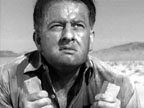 Name: The Rip Van Winkle Caper
Name: The Rip Van Winkle CaperEpisode Number: 60
Author: Rod Serling
Synopsis: Four gold thieves put themselves to sleep for one hundred years to escape capture in the present.
Theme(s): Greed, Crime Doesn't Pay
Recurring Serling Motif: Ironic twist ending, the technique most identified with The Twilight Zone. In this case, it's an easily spotted but thoroughly satisfying one. The thieves sleep for a century, wake up in the future, kill each other off to get a bigger share of gold, and once they're all dead we learn that in the future gold is worthless. See also: "The Eye of the Beholder"
Best Bit: The leader of the thieves, Farwell (Oscar Beregi) finally collapsing in the desert, offering his last bar of gold if only someone would help him.
Why It Works: A lot of Twilight Zones squander good premises on lukewarm executions (like "The Arrival," where we're presented with a delightful puzzle, an airplane that mysteriously lands without its crew, passengers, or cargo, and the solution is totally stupid, i.e. that the whole thing is a figment in the imagination of the FAA investigator) but "The Rip Van Winkle Caper" works in reverse. It's a fairly implausible idea (so how did the bank robbers get their hands on a gas that can make them sleep, without aging, for a century?) but it's used in the service of a strong moral fable with Serling's trademark touch of dark humor, and all of the characters act exactly as they should, given their situation and attitudes.
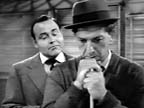 Name: A Game of Pool
Name: A Game of PoolEpisode Number: 70
Author: George Clayton Johnson
Synopsis: Obsessive pool player Jesse Cardiff (Jack Klugman), is sick of living in the shadow of late billiards great Fats Brown (Jonathan Winters), when the dead man appears in Jesse's pool hall for a match. If Jesse wins, he's the best pool man in history. If he loses, he also loses his life.
Theme(s): Be Careful What You Wish For, An Average Man's Desire For Greatness
Recurring Serling Motif: Another great ironic twist ending. Jesse wins the match, then discovers that being the best ain't all it's cracked up to be. See also: "Time Enough at Last"
Best Bit: The game comes down to one single ball. It's Jesse's shot. Fats starts to tell Jesse that the world is about more than pool, it's about loving, and living, and travelling. Then he flat-out cheats and drops his cue right on Jesse as he shoots, muffing his shot.
Why it Works: Though not written by Serling himself, "A Game of Pool" is classic Twilight Zone in the style of many I watched in elementary school, where the horrifying ending comes not from death or defeat, but from the hollow nature of victory. Episodes like these rise and fall on the strength of the actors — this is basically a two-character, one-act play — and Klugman and Winters both deliver fine performances. The same can also be said of the similarly themed "Last Night of a Jockey" (written by Serling) a one-character piece starring Mickey Rooney as a down-on-his-luck jockey who dreams of being big, and gets his literal wish, then realizes that no jockey has ever won a race because of his size.
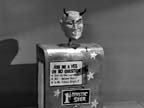 Name: Nick of Time
Name: Nick of TimeEpisode Number: 43
Author: Richard Matheson
Synopsis: A young couple (William Shatner and Patricia Breslin) stranded in a quaint Midwestern town becomes enthralled by an impossibly accurate fortune telling machine.
Theme(s): Fate, An Uncertain Future
Recurring Serling Motif: A man grows obsessed with an inanimate object that seems to take on a life of its own. These sorts of episodes, where a seemingly sane man quickly disintegrates into madness, were Twilight Zone staples; I saw at least two other very similar episodes during the marathon, including the simple but effective "The Fever" (written by Serling) about morally upright Everett Sloane losing his wallet and then his mind to a slot machine. All of these stories are warnings against some sort of compulsion: "The Fever" teaches about gambling addiction. "Nick of Time" is about blind belief in fate. See also: "The Dummy."
Best Bit: The production design of that innocuous little table-side fortune teller. The closer the camera gets to its devil's head design, the scarier it looks.
Why it Works: Some Twilight Zones are enslaved by the show's sci-fi style, but here writer Richard Matheson is free to tell a story whose biggest surprise is how little of it could only take place...in The Twilight Zone.
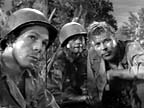 Name: A Quality of Mercy
Name: A Quality of MercyEpisode Number: 80
Author: Rod Serling, from a story by Sam Rolfe
Synopsis: A bloodthirsty American lieutenant (Dean Stockwell) in the waning days of World War II demands his weary platoon charge a cave full of a few surviving Japanese soldiers until he finds himself transported three years into the past and into the Japanese unit ready to strike against depleted U.S. forces.
Theme(s): The Lunacy of War, The Desire For Greatness
Recurring Serling Motif: Genre used to talk about a hot-button issue. Today, Clint Eastwood gets (rightful) acclaim for presenting the Japanese side of World War II and suggesting the sad futility of war, but Serling imparts essentially the same message with much the same impact, in a fraction of the time and scope. See also: "I Am the Night — Color Me Black"
Best Bit: The device used to switch Stockwell's character from American to Japanese and back is a pair of damaged binoculars. An obvious metaphor but it works.
Why it Works: Because it's obvious? Why ask why. It just does.
Also watched during the marathon, in order of preference from brilliant to meh: "Will the Real Martian Please Stand Up?" "The Hitchhiker," "Where is Everybody?" "And When the Sky Was Opened," "A Piano in the House," "Walking Distance," "I Sing the Body Electric," "The Dummy," "Mirror Image," "The Last Flight," "Little Girl Lost."
Labels: The Twilight Zone
Monday, January 01, 2007
IFC News' 2007 Spirit Awards Nominations Special (Hosted by me!) Premieres Tonight!
IFC News' 2007 Film Independent Spirit Awards Nominations Special premieres tonight (Monday) on IFC at 12:30 AM. Gives you all sorts of useful information about the awards, interviews with Felicity Huffman and Don Cheadle, and includes lots of footage of me being a weirdo on the streets of Santa Monica (if you're into that sort of thing).
If you miss it tonight, here are the additional airtimes:
Thu, Jan. 4 at 05:40 AM EST
Thu, Jan. 4 at 06:25 PM EST
Sun, Jan. 21 at 01:00 PM EST
Tue, Jan. 23 at 02:55 AM EST
Thu, Jan. 25 at 02:30 AM EST
Sun, Jan. 28 at 06:45 PM EST
Watch and comment as you see fit.
The Court-Martial of Billy Mitchell (1955)

Otto Preminger's 1955 CinemaScope curiosity The Court-Martial of Billy Mitchell came right on the heels of the great critical and financial success of The Man With the Golden Arm (1955), his Frank Sinatra heroin addiction film. Perhaps taxed after that intense drama - he shows zero interest in the story, focusing entirely on how to organize people in the frame.
Gary Cooper plays the title character, a General in the Air Corps who served in WW1. After the war, he agitates for further investment in the air fleet, convinced that is where the future of combat lay. He runs into bureaucratic indifference as his fliers die in large numbers due to out of date equipment. In order to shine a light on these deficiences, he intentionally slanders the Army and Navy brass in order to be court-martialed to give himself a bully pulpit to espouse his views.
Cooper is effective as always, and the supporting cast is uniformly superb, with Ralph Bellamy as a Southern congressman/lawyer, Elizabeth Montgomery as the widow of one of the fliers, Peter Graves and Darren McGavin as flyboys, and Rod Steiger, who shows up in the last 20 minutes as a psychotically intense prosecutor and pretty much steals the movie.
All that is well and good, but Preminger could care less. There's no effort given at creating tension, as all of the crashes are kept off-screen and when Mitchell's best friend dies, there's no scene of mourning or even consolation for the widow, who serves as the most important witness in his trial. She disappears from the film after her husband's death and returns only to fulfill the needs of the plot. This spartan plot procession is fascinating in its own right, it's skeletal quality becoming hypnotic as events pile up with no one seeming to care that much.
All this is incidental though, because what matters is those frames, of which every possible inch is used. No film I've seen made me more aware of the distortions the CinemaScope format makes at the edges of the shots - the left and right sides are slightly curved. There's a great shot on the National Mall where the Washington Monument looks about to tip over because of this effect. But I became aware of this because of how much of the frame he uses. There's always somebody on the extreme edge, I was struck by one shot in Cooper's office where he dismisses his guest once his assistant walks in, but the assistant is barely visible, his legs protruding from the extreme left side as Cooper sits down to the right. It's a throwaway shot, but an unbelievably strange one. It's filled with such curiosities like this, making the film a sort of notebook of ideas that Preminger would use in films he had more of an investment in - like Bonjour Tristesse (1958), which contains the greatest 'Scope compositions I've ever seen.
